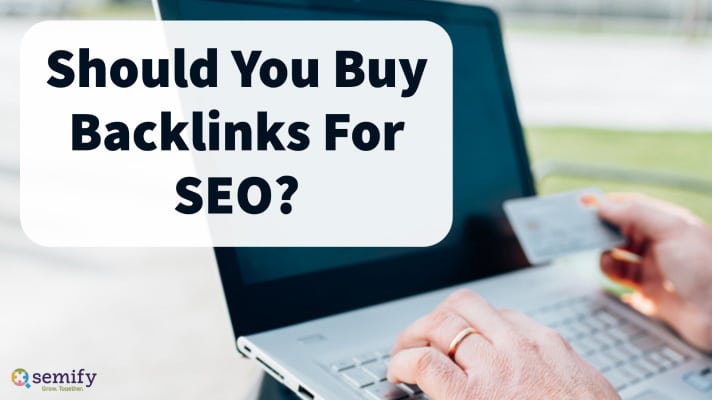
When most people think of search engine optimization, they picture optimized website content. But while keywords are an important part of SEO, they aren’t the only thing that help to determine website rankings in search engines.
Google wants to provide the most valuable and relevant results to web searchers. Even if a website contains keywords that align with the content users are looking for, that doesn’t always mean that the site in question will actually provide what a user needs.
That’s why Google has numerous other ways to determine the relative value provided by a website. Generally speaking, Google wants to reward websites that are deemed reputable.
One way that Google knows which websites are trustworthy is through endorsements from other websites. If a website in good standing gives a figurative seal of approval to another site, chances are good that Google will view that second site in a positive way.
So what does this have to do with backlinks? When a high-ranking website publishes a link to your site, you stand to benefit from their endorsement.
Sometimes, this process happens organically. If it does, that’s a huge win for you! But in other cases, it might require some legwork on your part.
The question is: should you buy backlinks in order to get ahead? Let’s take a closer look at the importance of backlinks, what makes a good backlink, why you should focus on link building, and whether it’s wise to start buying backlinks for SEO.
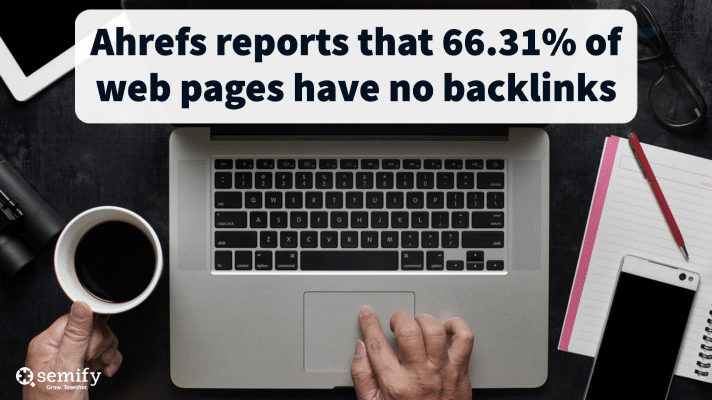
What is a Backlink?
Unless you’re brand new to SEO, you probably know what a backlink is. Simply put, it’s a published link on one site that directs to another site. These are also known as external links or inbound links because they’re coming from another source.
Backlinks matter because they’re used by Google to determine the value of a website, particularly in relation to its age and other factors. Just as a business without any online reviews might not convince consumers to make a purchase, a website that has very few “endorsements” from reputable site owners is harder for Google to trust.
According to Ahrefs, 66.31% of web pages have no backlinks at all! Since pages with more backlinks tend to have higher traffic volume, this means your site might not be living up to its potential.
Conversely, a website with high-quality backlinks from relevant and reliable sources will typically be seen as more valuable itself. While this isn’t the only thing that Google uses to determine site value, it can make a difference when all other ranking factors are relatively equal.
It’s crucial to remember that not all backlinks are created equal. In terms of quality, there are different levels of backlinks. A backlink from a highly respected website like Forbes or the New York Times, for example, will carry higher “weight” than even hundreds of backlinks from spammy, low-quality websites.
What’s more, links can contain certain attributes or directives that tell a search engine whether to consider the link to be an endorsement. “Do-follow” links are best for SEO purposes.
Having a certain number of “no-follow” links is fine, but the “do-follow” links are the ones you should be focusing on. These are the types of links that provide the most value, as they’re an actual endorsement of your site; “no-follow” links, on the other hand, imply that a site owner isn’t giving your link their vote of confidence. Therefore, “no-follow” links really won’t help your rankings.
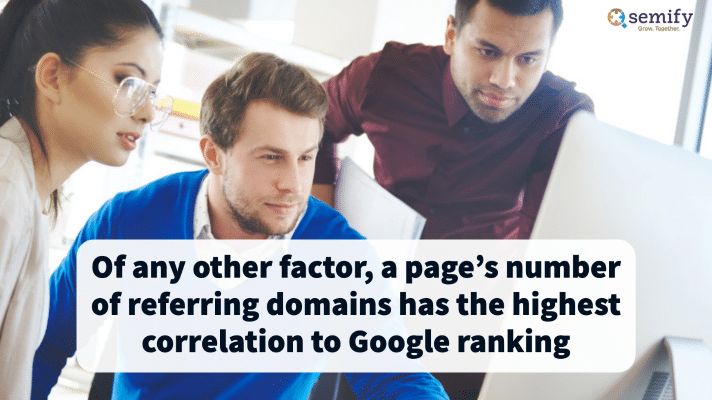
Where Can You Find Your Site’s Backlinks?
Backlinko reports that the number of referring domains for a given page has the highest correlation to Google rankings of any other factor.
But you might not know anything about the backlinks your site already has. Alternatively, you may want to check up on backlinks that you’re hoping to get or ones you’re worried about losing. You can find out all this information by looking at your backlink profile.
While you can manually track the backlinks your site has received in a spreadsheet or other shared document, that process is time-consuming and prone to user error. A platform like Ahrefs can provide you with an in-depth backlink profile for your site (or for your clients’ sites) that shows referring domains, a backlink history, and much more.
Since Ahrefs does require a subscription, working with a white label SEO company like Semify can grant you access to these tools for your clients and allow you to compile backlinking information in a professionally branded report.
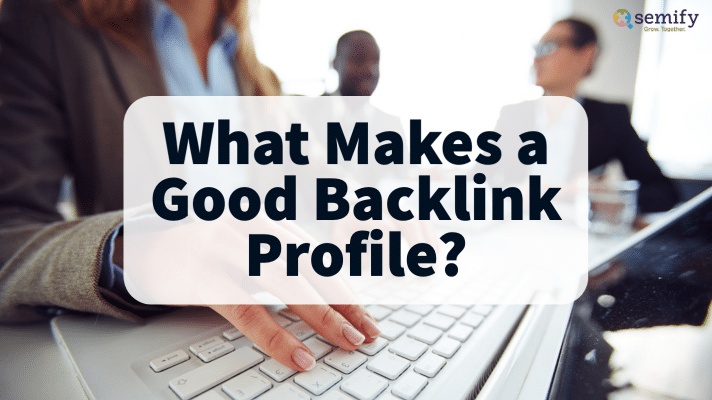
With that in mind, what makes a good backlink profile?
Ideally, you’ll want a profile that contains high-quality, diverse links.
The strongest backlink profiles contain lots of links from lots of different reputable sources (including .gov and .edu sites). Although it’s best if most of the links are do-follow, you should have some no-follow links mixed in.
The anchor text for your backlinks should also vary. You’ll want to have some branded anchor text (which contains your company or website name), some optimized anchor text (which would include relevant keywords for your products, services, or site), and some “zero anchors” (which are generally phrases like “read more” or “click here”).
When it comes to a single domain, more isn’t always better. Acquiring one do-follow link from an authoritative site is often preferable to getting five or 10 from the same domain.
Sure, it can be helpful to get a few different links (spread out over time and over different webpages) from the same site – particularly if the site is a trustworthy media outlet or another highly respected source. But rather than strike a deal with a low-level publisher for several different links in one piece, you may want to stick to just one, high-quality link from a given site owner in most cases.
For best results, you’ll want to focus on acquiring backlinks from sites that contain some kind of relevance to your own. This doesn’t mean you have to remove links that don’t perfectly align with your audience, but you’ll want to look at where your links are coming from so you can fill any gaps that exist.
In some cases, you may want to disavow certain links – like those that are obviously spammy and that could harm your reputation. Disavowing a link basically asks Google not to take it into account when determining your rankings.
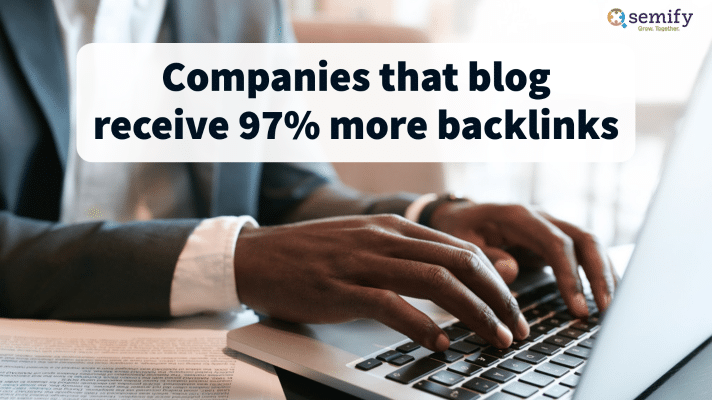
How Can You Acquire More Backlinks?
There are a number of ways to get more backlinks for your site. As mentioned earlier, one way is to simply hope that another site owner will include a backlink to your site somewhere. This does happen, albeit not consistently – particularly if you partner with a business or happen to be mentioned in the media.
But you can’t depend on this method to acquire as many high-quality backlinks as you realistically need for your site. It’s a nice bonus if it happens, of course, but you need something that produces regular results if you want to improve your rankings in search engine results pages (SERPs).
That’s why most businesses will include backlink building as part of their marketing strategy. Building backlinks can be tricky, as you’ll want to adhere to Google’s best practices to avoid potential penalties. But it is possible to acquire more backlinks in an organic and straightforward way.
One good way to obtain more backlinks for your site is to create guest posts or creative assets (like infographics) that other website owners can publish. If you establish a relationship with these site owners and they feel the content you’ve created can be of value to their readers, they may agree to publish this unique content on their site and include a link back to yours.
Even maintaining a blog on your own website can help you get more backlinks. In fact, companies that engage in blogging receive 97% more backlinks to their sites than organizations that don’t publish blog posts. If you’re creating valuable content on your website, chances are that other publishers might find that content valuable, too.
You might also consider becoming a contributor for an industry website. Round-ups, interviews, spotlights, and other kinds of useful content can allow you to share your insights and introduce your brand to a new audience while acquiring a backlink.
It may also be worth taking a look at the backlink profiles of your competitors to find new opportunities. You might get inspiration from what they’ve already done, form a new relationship with an established publisher, or take advantage of what your competitors aren’t yet doing to get ahead.
Finally, it should be noted that you can also trade with or buy backlinks from other websites. But just because you can doesn’t always mean you should – even if you’re discerning and want to buy quality backlinks.
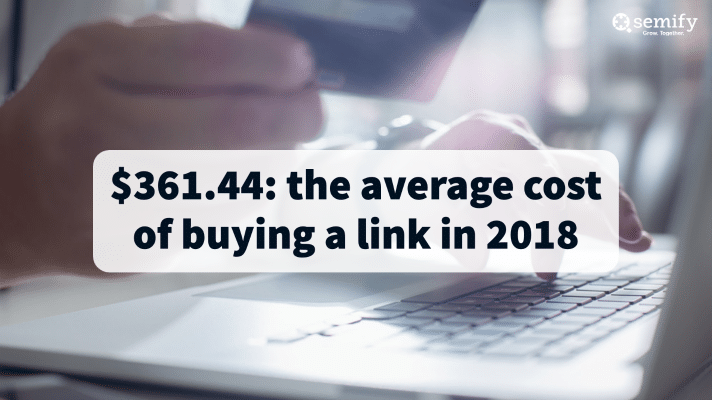
Should You Buy Backlinks For SEO Purposes?
The idea of buying backlinks for SEO is a controversial one. It should be noted that Google explicitly states:
“Buying or selling links that pass PageRank is in violation of Google’s Webmaster Guidelines and can negatively impact a site’s ranking in search results.”
However, that’s not the end of the discussion. Google goes on to say, “Not all paid links violate our guidelines. Buying and selling links is a normal part of the economy of the web when done for advertising purposes, and not for manipulation of search results.”
Essentially, this means that Google wants publishers that sell links to specify in the link attribute that they were purchased for advertising (rather than for SEO). These attributes include the inclusion of either a “no-follow” or “sponsored” designation in the link code. Alternatively, the publisher can add the link to a page that’s blocked from search engine crawlers.
Obviously, none of these options will really help your rankings. If search engines can’t crawl the page where your backlink appears, you won’t benefit. The same goes for “no-follow” and “sponsored” link attributions.
We’d also be remiss to point out that, if you want to buy quality backlinks, this practice will cost you. Not only could you risk penalization, but you’ll also pay quite a bit to publish these backlinks. An Ahrefs study from 2018 found that the average cost of buying a link came out to $361.44.
When you buy backlinks for SEO, you’ll typically see a wide range of prices. The higher a site’s domain rating, the more they will usually charge for a backlink. This makes sense because these backlinks are more valuable in terms of the endorsement they provide. At the lower end, you might spend a few hundred dollars for a few backlinks. But you could spend several thousand dollars acquiring backlinks – and if you aren’t careful, you might end up with nothing to show for it.
If you’re looking for a simple answer to the “should you buy backlinks?” question, most experts will tell you to be careful and do your homework on the domains your buying backlinks from. But despite the risk of penalization, many individuals and business owners will still buy backlinks in an effort to improve their rankings.
One of the reasons for this is that it’s far less time-consuming than acquiring backlinks organically. Although this practice can be quite expensive, it can be worth it. When you buy quality backlinks, you’ll save substantially on resources that would otherwise need to be spent on staffing and content creation.
That said, this practice is not completely without risk. Ultimately, your site could be penalized – even for buying quality backlinks from respected sites – if you purchase too many backlinks at once or over-anchor specific text or URLs. In addition, buying backlinks for SEO will be more likely to result in a penalty if the link looks unnatural and if the website is irrelevant or low-quality.
Here’s the bottom line: people are going to buy backlinks for SEO. And while it could prove helpful in the pursuit of your goals, you’ll need to be careful in your approach.
You’ll want to avoid buying backlinks for SEO if you’re determined to follow all of Google’s guidelines to the letter. But if you know you want to buy backlinks for your site, at least balance out your efforts with more white hat link building and do your research to make sure you’re working with reputable and relevant publishers.